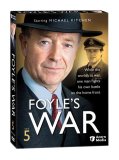| Reviews & Columns |
|
Reviews DVD TV on DVD Blu-ray 4K UHD International DVDs In Theaters Reviews by Studio Video Games Features Collector Series DVDs Easter Egg Database Interviews DVD Talk Radio Feature Articles Columns Anime Talk DVD Savant Horror DVDs The M.O.D. Squad Art House HD Talk Silent DVD
|
DVD Talk Forum |
|
|
| Resources |
|
DVD Price Search Customer Service #'s RCE Info Links |
|
Columns
|
|
|
Foyle's War: Set 5
Acorn Media has released the final go-around of Foyle's War: Set 5, a compilation of the last three English WWII home front mysteries starring Michael Kitchen as the cool, unflappable, determined DCS Christopher Foyle. The three films included are Plan of Attack, Broken Souls, and All Clear, all of which originally aired this past year in Britain as "Series 6" for the show (British for "season"), and which speedily tied up the series with the impending VE Day figuring prominently in the final fade-out. Perhaps a bit too speedily, at a second glance.
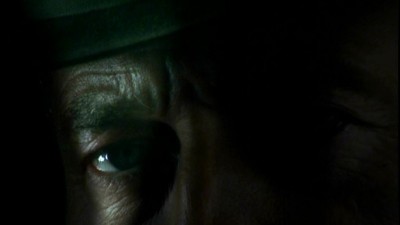
Newcomers to the series won't necessarily pick up on some of the nuances of the relationships between the main characters, but the largely self-contained mysteries still provide a fascinating skeleton for creator and writer Anthony Horowitz' methodical re-examinations of the largely forgotten (at least in terms of big-screen WWII movies) social and ethical issues that cropped up in even the most remote, quietest English towns and villages, due to the pervasive, corrosive impact of the Second World War. Indeed, this emphasis on the ever-encroaching influence of the war on the small seaside town of Hastings, East Sussex is what originally made Foyle's War so fascinating to me. Having seen countless WWII-themed films, the ones that deal with the various homefronts are in the distinct minority, and yet, Horowitz manages to incorporate into the trim mini-movies not only the standard English "village murder mystery" framework, but also war-related themes as diverse as espionage, secret reconnaissance installations, the debilitating effects of war on the psyches of returning soldiers, the displacement of home-bound vets, the changed dynamics of husbands and wives after years-long separations, and of course, the never-ceasing parade of profiteers, thieves, crooked politicians and murderers who rarely if ever show up in films that take a usually faux-innocent, rose-colored look at life "back home," away from the actual fighting.
Series Six opens in April, 1944, a full year after Detective Chief Superintendent Christopher Foyle (Michael Kitchen) has resigned from the force due to a previous case where a murderer walked free...because the government needed the culprit to walk free. The Hastings police force is now under the command of DCS John Meredith (Nicholas Day), an uninspiring leader whom we later learn has lost all feeling for the job due to the deaths of his two sons in the war. His shaky stewardship of the force has resulted in Foyle's driver and unofficial aid in his sleuthing, Samantha Stewart (Honeysuckle Weeks) to be fired, and for Foyle's right-hand man, Sergeant Paul Milner (Anthony Howell), to put in for a transfer. Morale is low and getting worse, until Meredith is (mistakenly) assassinated - Milner was the target - and Foyle is persuaded by his former superior, AC Henry Parkins (Michael Jayston), to return to full duty.
SPOILERS ALERT!
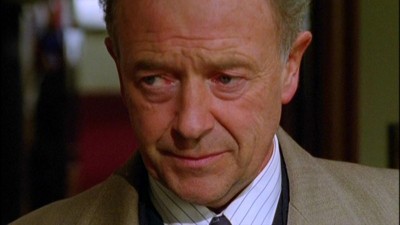
Prior to watching Foyle's War: Set 5, I did a little sleuthing of my own to see why the show was being wrapped up after the sixth series. Still enormously popular in the ratings, a few sources I read said the series was either yanked because it was too expensive to produce (which may be true, considering the exemplary production design with all its period cars, clothes and props) or because of a BBC executive who wasn't fond of the show. Regardless of the reason, the fact that Horowitz had to wrap up his storyline in a mere three shows - jumping ahead a full year in the storyline to do so - does lower the standards a bit from the excellent previous seasons. Certainly Horowitz and director Tristram Powell have the pace and rhythm of the show down pat. A brief background sets up the murder, and Foyle slowly but surely reaches a conclusion to his investigation, while Horowitz takes time to illuminate various aspects of WWII homefront problems that don't usually get attention in TV shows or feature films. Unfortunately, those very sub-themes presented in Foyle's War: Set 5 aren't all that "hidden" or unfamiliar to viewers (particularly in comparison to previous seasons of the show), creating a somewhat regrettable sense of déjà vu when watching the episodes. It's not that Horowitz and Powell don't drum up some appeal with their stories of broken vets returning home to wives who may have strayed, or a German priest who may be a spy, or a Polish refugee doctor whose family may all be dead in the Warsaw ghetto. Foyle's War is never less than at least interesting. But none of those stories are particularly new to viewers; none of them really feel like they've been "unearthed" from hidden pages of history like so many of the other Foyle plots.
Worse still, it's quite apparent that some hurry was involved in wrapping up the basic storyline to jibe with the end of the war. Clearly, the purpose of this final season is to end Foyle's tenure as DCS in conjunction with VE Day, but these monumental events (for viewers, Foyle had become an enormously popular six-year habit, with no identifiable reason to end it; and obviously, the enormity of WWII's ending as subject matter for a TV show) are combined in a surprisingly inconsequential manner. In All Clear, when Foyle, Stewart, Milner and cocky little git Sergeant Brooke (Jay Simpson), standing in the Hastings police station that will be soon be evacuated for new digs, all gather together around the wireless to hear Winston Churchill announce the unconditional surrender of Germany, it's a rather leaden, flat affair. Yes, Foyle's War is noted for being rather staid (in a good way) in its decorous (and historically correct) depiction of a more formal, more taciturn time, but absolutely nothing is made of this enormous (both fictionally and historically) event. I was expecting something, anything with a bit more meaning to the ending of both the war and series, but...nothing. The camera is as resolutely inexpressive as the actors are in this scene (and indeed, as is the screenwriter, as well). For a series whose episodes always seemed to be about more than just the surface, this is a rather alarmingly facile denouement.
Still, it's hard to actively dislike Foyle's War: Set 5 because what is there works well enough (if you put previous seasons out of your mind), and as always, Michael Kitchen as Foyle is a pleasure to watch. Along with Midsomer Murders' equally reticent, reserved John Nettles (as DCI Barnaby, in a series that Horowitz also wrote for), Kitchen's glacially laid-back Foyle is such a welcome anomaly from the hyperactively aggressive detectives and lawmen seen on American network TV shows. By contrast, he may appear at first positively comatose, but watching Kitchen carefully (like Nettles, as well), you see an actor reducing his "effects" to the absolute minimalist degree - with remarkable results. It's just a shame that the three final episodes of Foyle's War didn't send the character off, having survived the war keeping Hastings' subterranean dark side under control, with an appropriately (and proportional) dramatic weight.
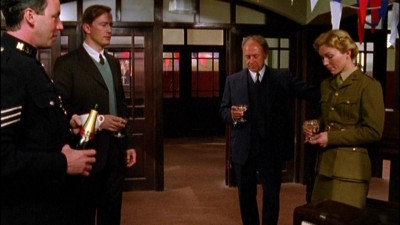
Here are the 3, 100 minute episodes of Foyle's War: Set 5, as described on their slimcases:
Plan of Attack
April 1944. DS Milner's investigation of a transportation fraud sets in motion a series of events that brings Foyle back to the force. As Hastings hosts an ecumenical conference on the morality of the continued Allied bombing, Foyle probes the suspicious death of a young cartographer from the Air Ministry office.
Broken Souls
October 1944. At a psychiatric clinic treating troubled soldiers, the investigation of a doctor's murder turns up no shortage of suspects among the patients and staff. It also complicates Foyle's friendship with Dr. Josef Novak, the Polish refugee who heads the clinic.
All Clear
May 1945. As all of Britain awaits the formal announcement of the war's end, Foyle reluctantly joins a committee preparing to keep public order during the celebration to come. But the end comes too soon for two men - one a stabbing victim, the other an apparent suicide.
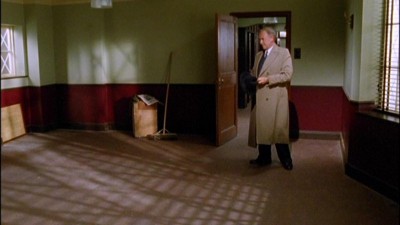
The DVD:
The Video:
The anamorphically enhanced, 1.78:1 widescreen video transfer for Foyle's War: Set 5 looks terrific, with a rich, true color palette, relatively sharp image, and no compression issues to speak of (helped by the fact that each episode gets its own disc).
The Audio:
The English 2.0 stereo sound mix is excellent, with all dialogue clearly heard, and with optional close-captioning.
The Extras:
On disc three of Foyle's War: Set 5, there's a 12:50 minute documentary, The Making of Foyle's War, that, while fascinating when discussing the Plan of Attack episode, doesn't do enough to sum up the series as a whole. Horowitz has a few moments on film, but this should have been a summing up of the show, not just an individual episode. Very brief text interviews with Weeks and Howell are included as bonuses, along with a text background on veteran police officer Charlie Banks, whom the show identifies as one of the inspirations for Foyle. There are also some brief text filmographies for the cast.
Final Thoughts:
While not nearly as successful as previous seasons, Foyle's War: Set 5 still sports some intriguing mysteries, and as always, a standout appearance by Michael Kitchen. Unfortunately, the series was in too big a hurry to wrap everything up, bringing the war and Foyle's adventures to a quick, tidy close, without giving the viewer the necessary emotional weight that each subtext deserved. I recommend Foyle's War: Set 5, but it's too bad they didn't go out on a high note.
Paul Mavis is an internationally published film and television historian, a member of the Online Film Critics Society, and the author of The Espionage Filmography.


|
| Popular Reviews |
| Sponsored Links |
|
|
| Sponsored Links |
|
|
| Release List | Reviews | Shop | Newsletter | Forum | DVD Giveaways | Blu-Ray | Advertise |
|
Copyright 2024 DVDTalk.com All Rights Reserved. Legal Info, Privacy Policy, Terms of Use,
Manage Preferences,
Your Privacy Choices | |||||||









